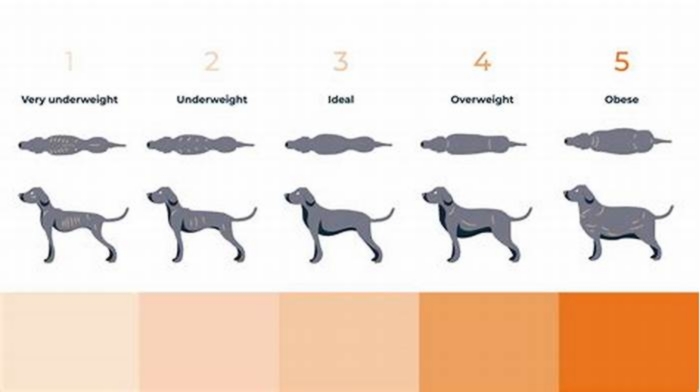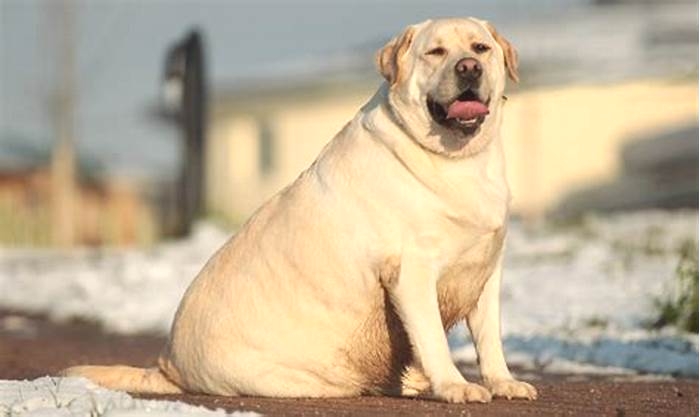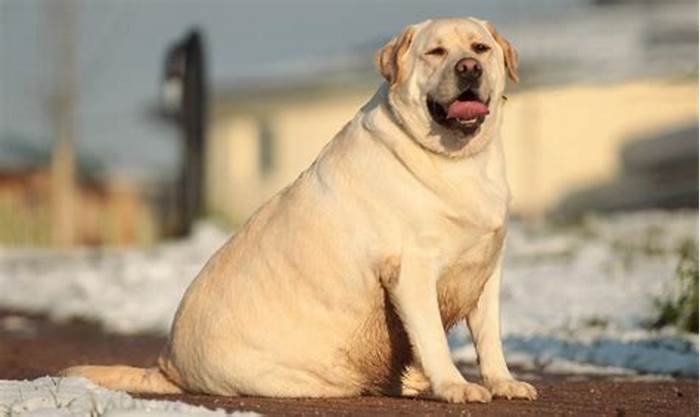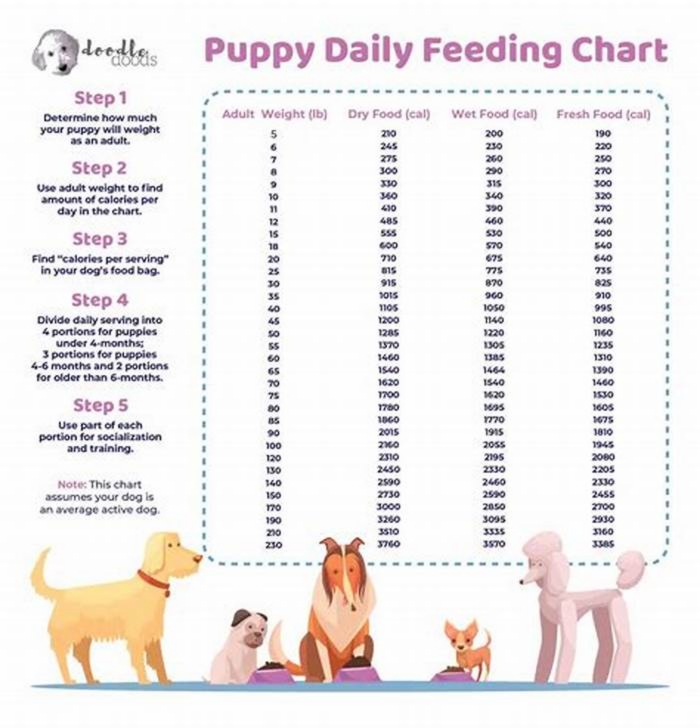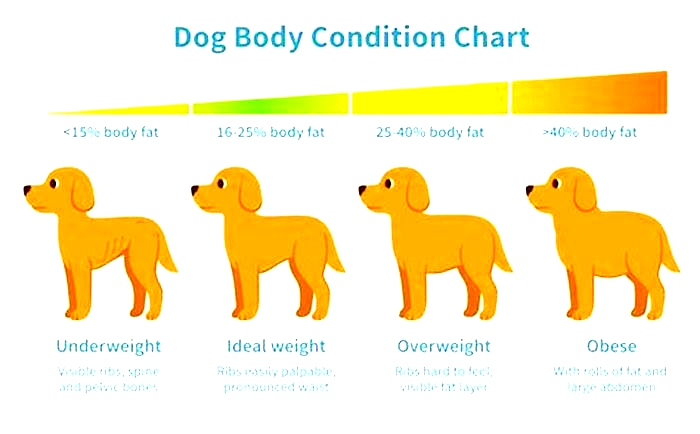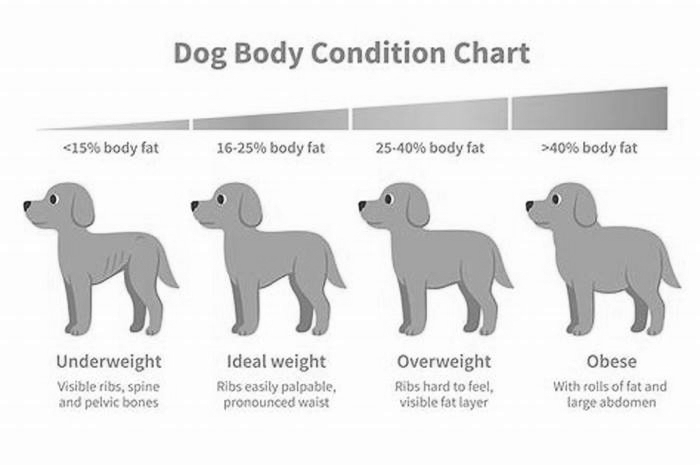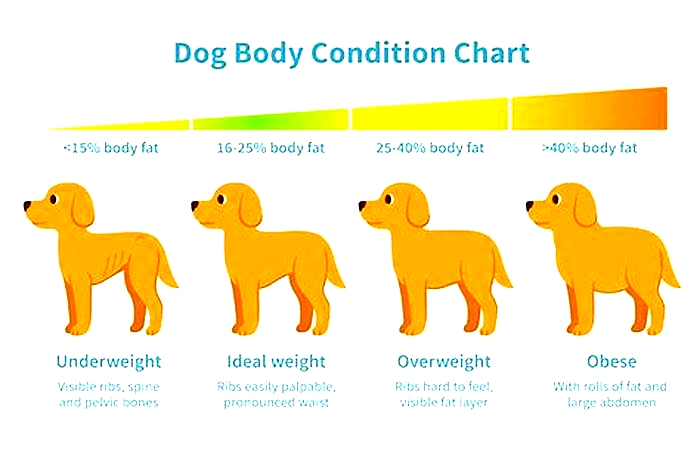How do I tell if my Labrador is overweight
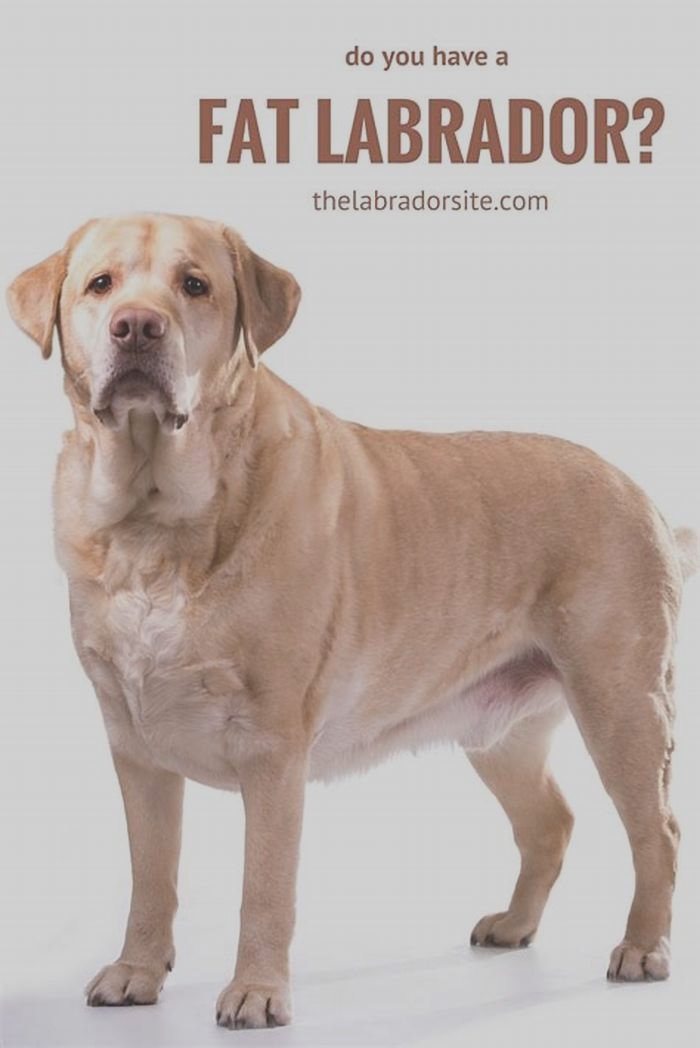
How To Tell If Your Labrador Is Overweight and what to do about it
Worried that your Labrador is overweight? Here are the signs that he might need to drop a few pounds, and some easy ways for you to help him lose weight. Todays guest post is by Kate OBrien from the Slimdoggy website
Labradors are known for their appetites. As a result of those healthy appetites and their ability to charm humans intofeeding them, they also are known for being a little chunky or in reality, overweight.
Labs are sporting dogs and are meant to run, swim, hunt and retrieve all day long. If your Labrador is overweight, you might worry that you are limiting his ability to do these things. In order to do that they must be healthy, strong and fit, not fat. Maybe you dont hunt with your Lab; many if not most Labs are family pets, but that doesnt mean they should be couch potatoes with an extra layer or two of fat.
A growing problem
Overweight dogs are a growing problem, pun intended. In the UK it is estimated that over one-third of all dogs are overweight1 and in the US, that figure rises to an astounding 54%.2 Labs are particularly susceptible to obesity and in the US, over 60% are overweight.
Why should we worry? What difference does it make if Buddy has a few extra pounds? Well, if you love Buddy and want him to live a long life, it makes a difference.
Weight and longevity
In the first-ever lifelong canine diet restriction study, a group of Labrador Retrievers was followed for 14 years, from birth until death.
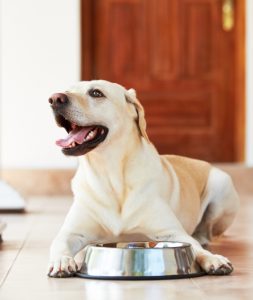 They found that a dogs median life span can be extended by 15%, nearly two years for the Labs in the study, by restricting their diet to maintain ideal body condition.3
They found that a dogs median life span can be extended by 15%, nearly two years for the Labs in the study, by restricting their diet to maintain ideal body condition.3
By keeping your Lab lean and fit you could extend their life for TWO YEARS. Thats a lot of extra time to spend with your best friend.
A lean dog also has fewer health and joint problems. Labs have a natural propensity for hip and elbow issues but keeping them fit helps keep arthritis at bay. Other serious diseases linked to being overweight include cardiovascular disease, kidney disease, and some forms of cancer.
Is my dog too fat?
Convinced you want to keep your dog fit, but dont know how to tell if they are at the proper weight? You are not alone. In the same survey from PDSA, they report that only 17% of owners look at body shape and weight before deciding how much to feed their pet, and 85% of vets say owners have no idea of healthy body shape for their pet.4
We wanted to offer a few suggestions to help you assess the body condition of your Lab.
- The first thing is to have an honest look at them. There are numerous body conformation charts for dogs you can use as a guide. We provide links to several different at the end of this article. Whichever chart you prefer, they all depict a waistline when looking at your dog from above and a slight tuck up behind the ribs. Take that guide and go look at your dog.Many folks argue that a Lab isnt supposed to have a tuck or a waist, but that standard is for show Labs and lets be honest, some of those show dogs are overweight. The reality for most of you is that your dog isnt a show dog, so having a tuck and being leaner than the show dogs you see on TV is better for their health and longevity.
- The second evaluation you can perform is whether you feel their ribs when you run your hands lightly over the sides of your dog. Note I said lightly, you shouldnt have to press in; you should easily feel them. Actually seeing the ribs of your Lab might mean your dog is too thin, so be careful of that as well.
- The scale is the third tool to use in your assessment. Weigh your dog and ask your Vet about their weight. Many vets are reluctant to bring up the subject of your pet being overweight, but if you express your concern, they will most likely give you an honest assessment. Be open to what they say.
What should he weigh?
The average Lab will weigh somewhere between 60-85 lbs or between 27-30 kgs. Use this range as a guide but be aware that some Labs with smaller or larger bone structures can be outside of the range and still be perfectly fit and at their optimal weight. Once you have an idea of whether your Lab is overweight or not, what do you do if they are?
Feeding for health
First and foremost, you have to educate yourself about what you are feeding your dog. Reading the dog food label and following what it says doesnt work. Those labels dont take into account the current condition of your dog, their age or their exercise level, all of which are important factors in how much your dog should eat each day. And they clearly dont take into account those extra treats you give your dog!
Most people dont properly measure their dogs food or even know how many calories are in the food they give them each day.
What about exercise?
Do you have any idea how many calories your dog burns each day? How can you figure out how many calories they need to eat if you dont know how many they burn? Too much work you say, just throw a scoop or two (or three) of food in the bowl and be done with it? Thats how you end up with an overweight and unhealthy Lab.
Theres an app for that!
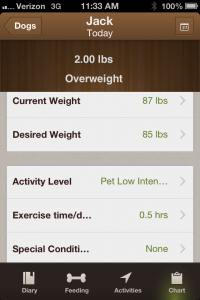 Figuring this out really isnt as hard as it sounds because, of course theres an iPhone APP for that.
Figuring this out really isnt as hard as it sounds because, of course theres an iPhone APP for that.
The SlimDoggy App is a simple App with a Daily Diary that allows you to look up and track all of this information for your dog. Like a Runkeeper and Weightwatchers for dogs, the App provides average daily calorie expenditures for a dog as well as calories burned through various types of exercise. It also has a database of over 2,500 dog foods and treats.
The Diary feature allows you to create a diary for your dog and calculate exactly how much they should be eating based on their daily exercise. The food database helps you pick the healthiest diet and the proper amount of food to feed them each day.
Dont have an iPhone? No problem, visit the SlimDoggy website and use the Calorie Widget. Soon we will have a full version of the App available on the website too! There are no excuses now.
Lets have healthy labs!
We all love our Labs and we want them to be in our lives for as long as possible and we want them as healthy as possible. Dogs dont have opposable thumbs, they cant feed themselves, and it is our responsibility to feed them a healthy nutritious diet of the proper proportions so that they are lean, fit and healthy. And then instead of giving them a treat, take them for a walk that is the best way to show your Lab you love them.
Kate OBrien and her husband, Steve, live in Camarillo, CA, with their dogs SlimDoggy Jack and Maggie May, senior Lab rescues. They are animal advocates and are active in the dog rescue and foster community. They write about their adventures with their dogs and about pet obesity, health, and fitness on theSlim Doggy website,Facebook, and Twitter.
Kate has had dogs in her life since she was a child, including the collies her grandfather used to breed and show. Allergies interfered, but then in adulthood Kate was able to bring dogs back into her life. Shes had numerous Labs, a couple of litters of puppies and many Lab fosters. Shes been able to share her love of exercise and fitness with her dogs and they inspire her to help other learn about better health, nutrition & fitness for their dogs.
FURTHER RESOURCES:
FOOTNOTES
1 PDSA Animal Wellbeing Report The State of Our Pet Nation, 2013
2 Association for Prevention of Pet Obesity Annual Survey Report 2012
3 Effects of diet restriction on life span and age-related changes in dogs, Kealey, Richard et.al., JAVMA Vol 220, No. 990, May 1, 2012
4 PDSA Animal Wellbeing Report The State of Our Pet Nation, 2013
More information on Labradors
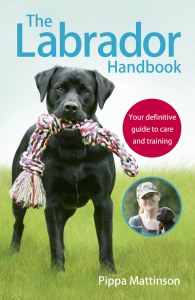 (paid link)You can find out more about how to keep your Labrador as fit and healthy as possible in the Health section of our website.
(paid link)You can find out more about how to keep your Labrador as fit and healthy as possible in the Health section of our website.
 (paid link)
(paid link)If youd like all of The Labrador Sites best information together in one place, then get your copy of The Labrador Handbook today.
The Labrador Handbook looks at all aspects owning a Labrador, through daily care, to health and training at each stage of their life.
The Labrador Handbook is available(paid link) worldwide.
The Labrador Site Founder

Pippa Mattinson is the best selling author of The Happy Puppy Handbook, the Labrador Handbook, Choosing The Perfect Puppy, and Total Recall.
She is also the founder of the Gundog Trust and the Dogsnet Online Training Program
Pippa's online training courses were launched in 2019 and you can find the latest course dates on the Dogsnet website
How Long Do Overweight Labs Usually Live?
Labradors are one of the longest-living breeds, so theyre generally healthy for most of their lives. However, a labradors lifespan might change if overweight or unhealthy in other ways.
Overweight labs usually live approximately 2.5 years less than an average and healthy-sized labrador. Since the average lifespan of a healthy labrador is 12 years, the average lifespan of an overweight labrador is generally around 9.5 years. Obesity in labradors can lead to cancer and heart disease.
The rest of this article will discuss the topic of overweight labradors in greater detail. Itll also discuss how being obese can affect a labrador in other ways and how to prevent your labrador from becoming overweight.
Why Overweight Labradors Dont Live as Long as Healthy Labradors
Overweight labradors generally dont live as long as healthy labradors. As mentioned, healthy labradors have an average lifespan of 12 years, and overweight labradors typically lose out on 2.5 years of their lives if theyre overweight. So, its essential to keep your labrador as healthy and fit as possible.
Overweight Labradors Have a Higher Chance of Illness
Like humans, labradors can also have complications related to obesity. Therefore, its essential to keep your labrador active and feed it a healthy, balanced diet.
Some of the illnesses labradors can experience due to obesity include:
- Heart disease
- Cancer
- Diabetes
- Osteoarthritis
- Bladder stones
All the above conditions can be detrimental to your labradors health and significantly shorten a labradors lifespan. You should keep a close eye on your overweight labrador as there will be a higher chance of illness.
How To Tell If My Labrador Is Overweight
You can tell whether your labrador is overweight by looking at it and examining its body. If your labrador has a wide, round shape with no definition, its likely to be overweight. Your labrador could also be overweight if it gets out of breath quickly after doing a small amount of exercise.
Now, Im going to discuss in greater detail the main things to look out for to determine whether your labrador is overweight or not.
Your Lab Is Panting More Than Normal
If your labrador is panting after a small amount of exercise, its likely overweight. Its normal for labradors to pant after doing strenuous exercise or if the weather is hot. However, panting aftera short walk isnt normal.
Overweight humans pant even more than healthier humans, and its the same for dogs. Once you start bringing your labrador out for more walks and feeding it a nutritious diet, you should slowly notice the panting subsiding.
Your Labs Body Shape Is Rounder
Body shape is another tell-tale sign of an overweight labrador. Most healthy labradors will have some definition to their bodies, but an overweight one wont. Youll notice the body is more round, and the skin might be looser than a healthy dogs skin.
Additionally, you wont be able to feel your labradors ribs if its overweight. In healthy labradors, you can feel the ribs easily when you press down.
Overweight Labs Are Often Sluggish
You may be able to tell by your dogs behavior whether its overweight or not. Overweight labradors are often sluggish. Theyll lay around all day and wont want to walk around much, but theyll eat a lot of food.
If your dog is acting sluggish, its essential to start immediately bringing it for more walks. You should also manage your labradors diet. If youre unsure how much food you should give your lab, its best to ask a vet.
How To Prevent Labrador From Becoming Overweight
To prevent your labrador from becoming overweight, you should feed it a healthy and balanced diet. Its also essential to keep your labrador active to keep it at a healthy weight. Labradors are generally energetic dogs, so bringing them out for walks will be an enjoyable experience for them.
Labradors are high-energy and love to keep active, so its essential to keep them occupied and busy as much as possible. Not only is it good for their mental health, but its also good for their physical health.
Bringing your lab on a walk every day will significantly decrease the chances of becoming overweight or obese. A simple walk around the park or the block is an excellent way for you and your dog to get some exercise (and bonding time) together!
You should also ensure youre feeding your lab a balanced diet. Theres not much use in bringing it for walks if youre going to over-feed. So, choosing the right portions is also crucial in preventing obesity in your labrador.
It may be a good idea to feed your labrador wet food if its trying to lose weight because wet food keeps dogs fuller for longer. Wet food is more filling than dry food because it contains a high water content, which helps fill the stomach for long periods.
Can an Overweight Labrador Lose Weight?
An overweight labrador can lose weight by increasing exercise and planning a healthy (and safe) diet. Give your labrador at least one hour of exercise every day if you want it to lose weight and get healthy. Feeding your lab wet food is also an excellent way to promote weight loss.
Although a labrador can lose weight, its not always an easy process. The average weight of a healthy labrador should be between 55 and 75 pounds (24.95 and 34.02 kg), so you should weigh your lab.
You can create a weight loss goal once you know precisely how heavy your lab is. The most important thing is that you dont rush the process. If you overexert your lab, it can experience several problems, such as back injury, joint injury, and respiratory problems.
Easing into the fitness plan is the best way to do it. Its the safest way to do it, and it also keeps your lab comfortable without getting overexerted.
Start With Short Walks and Slowly Build It Up
To help your overweight lab lose weight, start with a few short walks in one day rather than one long walk. Consider going on three 15 to 20-minute walks for the first few weeks. This gives your lab a chance to rest and rejuvenate before the next walk, and it also gives the muscles a chance to relax.
If your dog hasnt been active in a long time, bringing it on a long walk straight away will be uncomfortable and unenjoyable. Its also good to start slowly and work up the speed as the weeks go by.
Bring Water on Walks
For the first few weeks, your dog will find it strenuous to go on so many walks. Itll likely get thirsty quickly, so you should bring some water every time you go out. Dehydration can be detrimental to your dogs health, so this step is essential.
Conclusion
Overweight labradors live around 2.5 years less than healthy labradors on average, which makes the average lifespan of an overweight labrador approximately 9.5 years. However, there are ways to prevent your lab from becoming overweight and help it lose weight.
Here are the most important things to remember:
- Overweight labradors live an average of 9.5 years.
- Overweight labradors are more susceptible to diseases and illnesses, such as cancer and heart disease.
- Wet food is good for dogs who need to lose weight.
- To help your lab lose weight healthily, ease into exercise to prevent injury.

